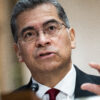While the world is focusing on a terror threat to Sochi and Russia during this month’s Winter Olympics, a prominent Russian opposition leader, Boris Nemtsov, warns that a terrorist attack is not the only danger.
The Sochi Olympics have spotlighted Russia’s systemic problems, including corruption, which have led to poorly constructed Olympic buildings and infrastructure that will put the lives of the athletes and those in attendance at risk.
This past week, Nemtsov presented findings of a report on corruption in Sochi to the National Press Club in which he identified poorly built sports facilities and infrastructure as one of the greatest threats to the games.
Corruption, violations of building codes, and the use of unskilled migrant labor has created risks during the Olympics and beyond, as the arenas will be used for years beyond the current winter sports extravaganza.
In 2012 alone, 40 accidents happened at construction sites during preparations for the Winter Games, resulting in 25 deaths. In March, a tunnel collapsed during construction, causing a residential house to sink. Some of the Olympic stadiums were built on swamp land and lack proper foundations.
How Sochi was chosen as the location for the Winter Olympics is shrouded in mystery. Out of all the famously cold parts of Russia, the Russians chose a site located in a sub-tropical region that has a very mild winter and an average temperature of 40 degrees F. In addition to the grave dangers posed by the terrorist threat and the poorly built facilities, warm weather could also disrupt the games. According to Nemtsov, Russian President Vladimir Putin picked Sochi without consulting experts or the public.
Indeed, one of the reasons for the exorbitant price tag of the Olympic Games—estimated at around $50 billion, more than was spent on all previous Winter Olympics combined—is the fact that the mammoth construction projects were given very little public scrutiny. Even though 100 percent of the Sochi Olympics is state-funded, there is no public disclosure of the expenditures.
Nemtsov shared that Russians jokingly call the Sochi Olympics “Corrumpiada”—a combination of the words “corruption” and olimpiada, which means “Olympics” in Russian. Around 50 percent to 60 percent of the entire Olympic budget has been stolen by Russian officials, Nemtsov claims. This would explain some of the massive costs associated with many of the Olympic-related construction projects: For example, the cost of building just one 30-mile-long highway in Sochi is three-and-a-half times the cost of the American Mars program.
Because of their sky-high price tag and poorly chosen location, Nemtsov has called the Sochi Games a “plastic spoon that costs billions.” In addition to the money wasted, the massive corruption surrounding the Games cost lives during the questionable construction of Olympic facilities.
Now those poorly constructed facilities pose a danger to the athletes and others in Sochi that’s as real as any terrorist threat.
Stanislav Miachkov is currently a member of the Young Leaders Program at The Heritage Foundation. For more information on interning at Heritage, please click here.


























